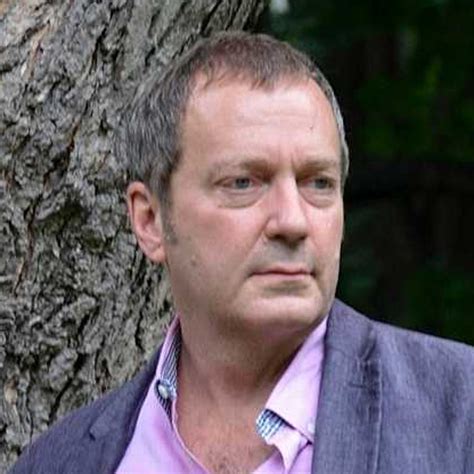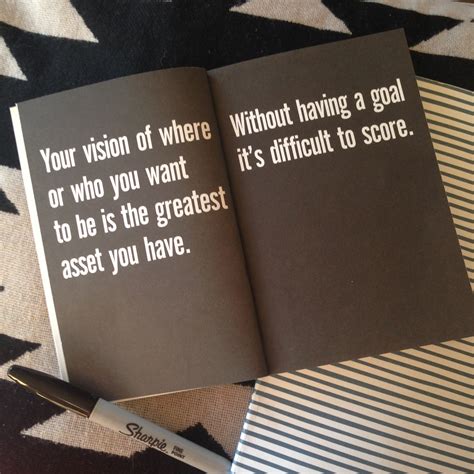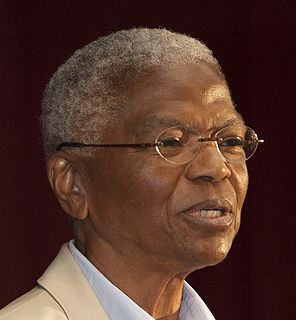Top 507 Proving Quotes & Sayings - Page 9
Explore popular Proving quotes.
Last updated on December 22, 2024.
Marriage is a pretty amazing thing when you think about it. For two people to live together for so long under the same roof is a big accomplishment. Fifty-year anniversaries are becoming extinct, yet again proving that long marriages deserve awards and praise. Sometimes I see old people in restaurants sitting together eating their meals and I watch them. Sometimes it makes me sad. They don't even talk. Is it because they have nothing else to say, or can they simply read each other's mind by now?
So my antagonist said, "Is it impossible that there are flying saucers? Can you prove that it's impossible?" "No," I said, "I can't prove it's impossible. It's just very unlikely." At that he said, "You are very unscientific. If you can't prove it impossible then how can you say that it's unlikely?" But that is the way that is scientific. It is scientific only to say what is more likely and what less likely, and not to be proving all the time the possible and impossible.
(Howard Dean) is proving that the Internet is a better, cheaper, and faster way to raise money than the old glad-handing of special interests and fat cat donors. He's also about to demonstrate that the Internet is a better place to spend campaign dollars than are TV stations and media time buys. The fact that Internet communications is free makes one-on-one retail politics more effective, more rapid, and less costly than mass communication.
No, there is nothing on the face of the earth that can, for a moment, bear a comparison with Christianity as a religion for man. Upon this the hope of the race hangs. From the very first, it took its position, as the pillar of fire, to lead the race onward. The intelligence and power of the race are with those who have embraced it; and now, if this, instead of proving indeed a pillar of fire from God, should be found but a delusive meteor, then nothing will be left to the race but to go back to a darkness that may be felt, and to a worse than Egyptian bondage.
Sacred Scripture, since it has no science above itself, can dispute with one who denies its principles only if the opponent admits some at least of the truths obtained through divine revelation; thus we can argue with heretics from texts in Holy Writ, and against those who deny one article of faith we can argue from another. If our opponent believes nothing of divine revelation, there is no longer any means of proving the articles of faith by reasoning, but only of answering his objections - if he has any - against faith.
John rose to his feet and apologized to Holiday. Her mom seethed. Her dad tried to talk to her seething mom. Holiday tried to touch everyone. Burnett continued to glare green daggers at John, proving how hard it was for a vampire to accept an apology. Not that she blamed him. Kill him. Kill him. She cheered the vampire on. Lucas hadn't stopped scowling at Derek and Derek hadn't stopped ignoring Lucas.
Why waste time proving over and over how great you are, when you could be getting better? Why hide deficiencies instead of overcoming them? Why look for friends or partners who will just shore up your self-esteem instead of ones who will also challenge you to grow? And why seek out the tried and true, instead of experiences that will stretch you? The passion for stretching yourself and sticking to it, even (or especially) when it’s not going well, is the hallmark of the growth mindset. This is the mindset that allows people to thrive during some of the most challenging times in their lives.
When we can let go of what other people think and own our story, we gain access to our worthiness—the feeling that we are enough just as we are and that we are worthy of love and belonging. When we spend a lifetime trying to distance ourselves from the parts of our lives that don’t fit with who we think we’re supposed to be, we stand outside of our story and hustle for our worthiness by constantly performing, perfecting, pleasing, and proving. Our sense of worthiness—that critically important piece that gives us access to love and belonging—lives inside of our story.
McEwan's Atonement…truly dazzles, proving to be as much about the art and morality of writing as it is about the past…. The middle section of Atonement, the two vividly realized set pieces of Robbie's trek to the Channel and Briony's experiences with the wounded evacuees of Dunkirk, would alone have made an outstanding novel…. There is wonderful writing throughout as McEwan weaves his many themes — the accidents of contingency, the sins of absent fathers, class oppression — into his narrative, and in a magical love scene.
I think that maybe happy families don't need stories the way unhappy families need stories. Maybe they're too busy living that they don't actually step back and talk about life like the Anton Chekhov quote. I prefer Anton Chekhov to Lev Tolstoy, and the reason is because of what he leaves out. Sometimes I think Tolstoy had a theory that he was proving and he proved it. Chekhov is more ambiguous.
It's important, therefore, to know who the real enemy is, and to know the function, the very serious function of racism, which is distraction. It keeps you from doing your work. It keeps you explaining over and over again, your reason for being. Somebody says you have no language and so you spend 20 years proving that you do. Somebody says your head isn't shaped properly so you have scientists working on the fact that it is. Someone says you have no art so you dredge that up. Somebody says you have no kingdoms and so you dredge that up. None of that is necessary. There will always be one more thing.
It is indeed better (as no one ever could deny) that men should be led to worship God by teaching, than that they should be driven to it by fear of punishment or pain; but it does not follow that because the former course produces the better men, therefore those who do not yield to it should be neglected. For many have found advantage (as we have proved, and are daily proving by actual experiment), in being first compelled by fear or pain, so that they might afterwards be influenced by teaching, or might follow out in act what they had already learned in word.
Risks are a measure of people. People who won't take them are trying to preserve what they have. People who do take them often end up having more. Some risks have a future, and some people call them wrong. But being right may be like walking backwards proving where you've been. Being wrong isn't in the future, or in the past. Being wrong isn't anywhere but being here. Best place to be, eh?
Let's not forget that for thousands of years the institution of marriage has been between a man and a woman. Until quite recently, in a limited number of countries, there has been no such thing as a marriage between persons of the same gender. Suddenly we are faced with the claim that thousands of years of human experience should be set aside because we should not discriminate in relation to the institution of marriage. When that claim is made, the burden of proving that this step will not undo the wisdom and stability of millennia of experience lies on those who would make the change.
It is part of the photographer's job to see more intensely than most people do. He must have and keep in him something of the receptiveness of a child who looks at the world for the first time or of the traveler who enters a strange country We are most of us too busy, too worried, too intent on proving ourselves right, too obsessed with ideas to stand and stare Very rarely are we able to free our minds of thoughts and emotions and just see for the simple pleasure of seeing. And so long as we fail to do this, so long will the essence of things be hidden from us.
All that the posture of skepticism accomplishes is to freeze the ego in an ignorantist poverty that never stretches or diversifies its resources of imagination or understanding. Any uncultured cretin can close his eyes and try to reduce the issues down to linear simplisms and say, "I am doubting, I am proving my magisterial or sovereign control over my own mind." Doubt is a useful and significant test of one's critical powers, but by itself it bears little if any significant cultural charge of enlightenment or satori; indeed it is the very opposite kind of thing.
...One of the most important lessons, perhaps, is the fact that SOFTWARE IS HARD. From now on I shall have significantly greater respect for every successful software tool that I encounter. During the past decade I was surprised to learn that the writing of programs for TeX and Metafont proved to be much more difficult than all the other things I had done (like proving theorems or writing books). The creation of good software demand a significiantly higher standard of accuracy than those other things do, and it requires a longer attention span than other intellectual tasks.
The sacred rites, although not instituted specifically for proving the truth of the dogmas of the Catholic Faith incontrovertibly, are effectively the living voice of Catholic Truth, the oft-sounded expression of it. For that very reason the true Church of Christ, even as she shows great zeal to guard inviolate those forms of divine worship - since they are hallowed and are not to be changed - sometimes grants or permits something novel in the performance of them in certain instances. This she does especially when they are in conformity with their venerable antiquity.
If you're in music, you're in music, and if you're in music you just want to keep making records and playing. That's what it's about, isn't it? At least, that's what I always thought it was about, anyway. I don't think I could bear years and years off. Perhaps in me older, older age, maybe I will, for physical reasons. But to me you've always got to keep proving yourself. I never want to just sit on me laurels. You have to keep forging, to prove yourself to yourself. I always think, every time I start a record, this could be the best thing I've ever done.
I am the stereo-typical classic lapsed Catholic. Religious themes crop up in my songs sometimes as metaphors and other kinds of touchstones for getting at issues and "deeper issues," and all that. Right now, honestly, I think all religion is proving itself to be a NET negative on the human race. I recognize its valuable place in individual lives and many larger communities - I know the good that is done in its various names all over the world, but I don't believe in it anymore, and I see the negative aspects dragging us down at a much faster rate than the positive ones are bouying us up.
Now that physics is proving the intelligence of the universe what are we to do about the stupidity of mankind? I include myself. I know that the earth is not flat but my feet are. I know that space is curved but my brain has been condoned by habit to grow in a straight line. What I call light is my own blend of darkness. What I call a view is my hand-painted trompe-l'oeil. I run after knowledge like a ferret down a ferret hole. My limitations, I call the boundaries of what can be known. I interpret the world by confusing other people's psychology with my own.
We allowed you a charade of trivial freedoms in order to avoid making those impositions on you that are in the end both the training ground and proving ground for true independence. We pronounced you strong when you were still weak in order to avoid taking part in the long, slow, slogging effort that is the only route to genuine maturity of mind and feeling. Thus, it was no small anomaly of your growing up that while you were the most indulged generation, you were also in many ways the most abandoned to your own meager devices by those into whose safe-keeping you had been given.
Not that I ever felt the necessity of proving that all human beings suffer the same way, feel joy the same way, but it happened on my way - when I get close to these people, just by the simple intervention of translation I can actually reach them and ask them something, and their reaction is as I expected. I see that the relationship goes so smoothly, and I realize that cultural languages and specificities are nothing but simple obstacles that you can easily overcome. It's obvious that human beings are the same wherever they are.
A sentence begins quite simply, then it undulates and expands, parentheses intervene like quick-set hedges, the flowers of comparison bloom, and three fields off, like a wounded partridge, crouches the principal verb, making one wonder as one picks it up, poor little thing, whether after all it was worth such a tramp, so many guns, and such expensive dogs, and what, after all, is its relation to the main subject, potted so gaily half a page back, and proving finally to have been in the accusative case.
It seemed to Alabama that, reaching her goal, she would drive the devils that had driven her - that, in proving herself, she would achieve that peace which she imagined went only in surety of one’s self - that she would be able, through the medium of the dance, to command her emotions, to summon love or pity or happiness at will, having provided a channel through which they might flow. She drove herself mercilessly, and the summer dragged on.
Tainting the Tea Party movement with the charge of racism is proving to be an effective strategy for Democrats. There's no evidence that Tea Party adherence are any more racist than other Republicans and indeed many other Americans. But getting them to spend their time purging their ranks and having candidates distance themselves should help Democrats in November, having one's opponent rebut charges of racism is far better than discussing joblessness.
I join cordially in admiring and revering the Constitution of the United States, the result of the collected wisdom of our country. That wisdom has committed to us the important task of proving by example that a government, if organized in all its parts on the Representative principle unadulterated by the infusion of spurious elements, if founded, not in the fears & follies of man, but on his reason, on his sense of right, on the predominance of the social over his dissocial passions, may be so free as to restrain him in no moral right, and so firm as to protect him from every moral wrong.


























